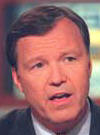Rep. Cox Suggests Shutting Down the FCC
May 19, 2004. Rep. Chris Cox (R-CA) suggested abolishing the Federal Communications Commission (FCC) because it was created to regulate communications markets characterized by scarcity and lack of competition -- conditions which no longer exist.

Rep. Cox (at right) said that rather than rewriting the Communications Act, the Congress should recognize that there is now competition in communications, declare victory, and shut down the FCC. He spoke at the House Commerce Committee's Subcommittee on Telecommunications and the Internet's May 19 hearing titled "Competition in the Communications Marketplace: How Convergence Is Blurring the Lines Between Voice, Video, and Data Services".
Rep. Cox is a senior member of the House Commerce Committee, and its Subcommittee on Telecommunications and the Internet. He is also the Chairman of the House Homeland Security Committee.
Rep. Cox's Comments. "Given the pace of technological change, it is important to have an almost daily reality check, to ensure that we ensure that we retain [?] the products, the markets, the consumers and the producers who have to live under laws that we write. And with all of the options for consumers today, and all of the competing platforms that are now able to offer video, voice and everything else that can be converted into digital data, we might wonder whether our laws can possibly keep up."
"Seven years ago, Peter Huber published a book arguing that it is time to shut down the FCC, and let common law and the courts settle any disputes that arise when there has got to be change in the high tech market because anything else would fall through."
"Given that the premise of our legislation and regulation over the last century is to regulate communications, based upon the apparent scarcity of communications, today's hearing gives us an opportunity to step back and ponder these big questions -- whether we still need the kinds of regulators that we presuppose, when cable companies, phone companies, wireless companies, or even satellite companies are all competing to provide a package of digital services."
"This seems to be the competition that we have all sought for a long time. And so, perhaps we should declare victory. perhaps, even envision the Peter Huber future, and if we shut down the FCC, and [inaudible phrase]."
"As we look at all of the products to be demonstrated, all of them enabled by the internet, and driven by the advances in computer hardware and software markets, it is useful to remember that these largely unregulated markets have a history of innovation that the highly regulated telephone market cannot match. I think that it is not because of the lack of innovative creativity in telephony, but rather the difference in the regulatory environment. We should be weary about 1930s era telecom regulation into these high tech industries, and we should be seeking ways to liberate telephony from the heavy regulation that began so long ago in the age of analog scarcity and dominate carriers."
"There is much talk in Washington now of Congress gearing up for a rewrite of America's communications law. And, that possibly what we will learn today is that retirement would be a better option."
Peter Huber. Peter Huber wrote Law and Disorder in Cyberspace: Abolish the FCC and Let Common Law Rule the Telecosm [Amazon] in 1997.
He wrote that "It is time for fundamental change. It is time for the Federal Communications Commission to go." He elaborated that "Until 1996 the telecosm was governed by laws written half a century ago. The rules for the telephone industry dated back to 1887. They had been written at a time when land, air, water and energy all seemed abundant, while the telecosm seemed small and crowded, a place of scarcity, cartel, and monopoly, one that required strict rationing and tight, central control."
"In the last decade, however, glass and silicon have amplified beyond all prior recognition our power to communicate", wrote Huber. "New technology has replaced scarcity with abundance and cartels with competition."
Huber also points out that "We never did create a Federal Computer Commission. The computer industry has nonetheless developed interconnection rules and open systems, set reasonable prices, and delivered more hardware and more services to more people faster than any other industry in history."
"Now, in the 1990s, with the telecosm growing explosively all around us, with the cacophony of free markets already drowning out the reedy proclamations of a senescent Commission, the only outlandish proposal is that we should keep it."
"The Commission must go", said Huber.
See also, prepared testimony of Peter Huber for a Senate Commerce Committee hearing of October 1, 2002.
At a hearing of the Telecommunications Subcommittee six years ago Rep. Cox accused the FCC
of "sucking the internet into the vast web of the Federal Computer
Commission." See,
TLJ story titled "Congressmen Decry the ``Federal Computer Commission´´",
March 31, 1998. At that time, Rep. Cox was arguing against the FCC's newly
created e-rate subsidy program. The program still exists.